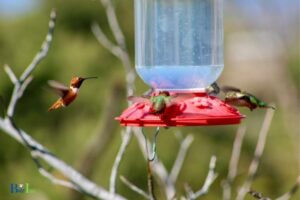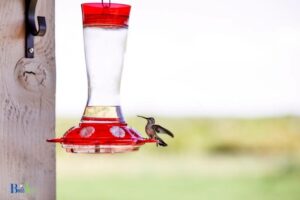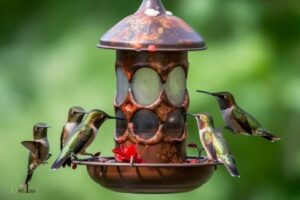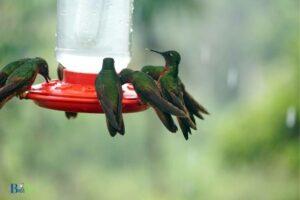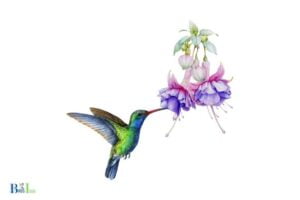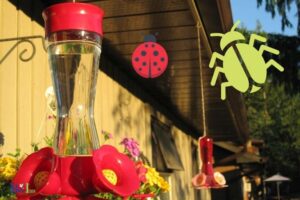Can You Feed Hummingbirds Honey Water: No, Explain!
No, feeding hummingbirds honey water is not recommended.
Honey water is harmful to hummingbirds because it can cause fatal fungal infections and lacks essential nutrients needed for their survival.
Moreover, honey doesn’t contain the necessary nutrients like sucrose, which hummingbirds get from nectar.
It is important to stick with the recommended sugar-water mixture to ensure their survival and well-being.
This mixture mimics the sucrose found in nectar, which is a primary source of energy for hummingbirds.
3 Reasons About Feed Hummingbirds Honey Water
| No | Reason | Alternative Solution |
|---|---|---|
| 1 | Honey water can promote harmful bacteria and fungus growth, which can be detrimental to a hummingbird’s health. | Use a 4:1 ratio of water to white sugar solution. |
| 2 | Honey may not provide all the necessary nutrients that hummingbirds need from natural nectar. | Plant flowers that attract hummingbirds, such as trumpet vine or bee balm. |
| 3 | Honey can ferment quickly, leading to potential harm if ingested by hummingbirds. | Clean and refill your hummingbird feeder with fresh sugar water every few days to prevent spoilage. |
Key Takeaway
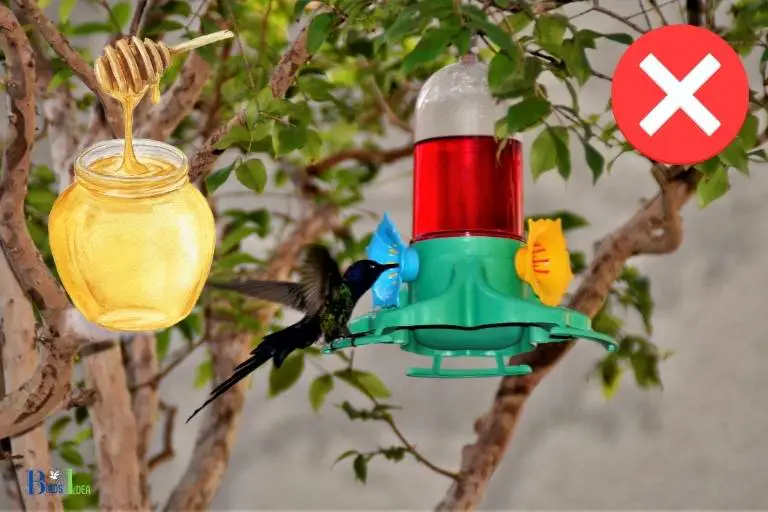
Five Facts About: Hummingbirds Honey Water
What is the Benefit of Feeding Hummingbirds Honey Water?
Feeding hummingbirds honey water can seem like an attractive alternative to traditional sugar water, as honey is perceived as a more natural sweetener.
However, it is essential to understand the benefits and potential drawbacks of this decision before incorporating honey water into your hummingbird feeder.
Benefits:
- Honey is a natural sweetener that can be a tempting treat for hummingbirds, attracting them to your feeder and providing a source of energy.
Drawbacks:
- Honey can promote the growth of harmful bacteria and fungi, making it potentially unsafe for hummingbirds to consume.
- Honey may crystallize and harden, making it difficult for the birds to extract and feed on.
- Honey’s nutritional composition is different from the nectar hummingbirds would naturally consume in the wild, potentially causing digestive issues.
Use a 1:4 ratio of white granulated sugar to clean water when making sugar water for your hummingbird feeder.
This solution more closely resembles natural nectar, and it is less likely to promote mold and bacterial growth that could harm hummingbirds.
“While honey has antibacterial properties that can be beneficial for humans, it can actually be harmful to hummingbirds,” warns bird expert and author Sally Roth. “It can promote the growth of harmful fungi and bacteria in their guts.”
birdsidea
How to Make Honey Water for Hummingbirds?
Making honey water for hummingbirds can be a simple and nutritious alternative to traditional sugar water.
However, it is essential to prepare and maintain the solution correctly to avoid harming these delicate creatures.
Honey is rich in natural sugars and minerals that can provide energy and nutrients for hummingbirds, but it can also harbor harmful bacteria if not properly diluted and cleaned.
To make honey water for hummingbirds, follow these steps:
Measure and mix ingredients: Combine four parts water with one part honey. Ensure the water is lukewarm to help dissolve the honey easily.
Stir well: Mix the solution until the honey dissolves completely, ensuring there are no visible clumps remaining.
Cool the mixture: Allow the honey water to cool down to room temperature before serving it to the hummingbirds. This prevents harm from consuming hot liquids.
Fill the feeder: Pour the cooled honey water into a clean hummingbird feeder.
Maintain cleanliness: Clean the feeder every 2-3 days, depending on the temperature, to prevent bacteria and mold growth that can be harmful to hummingbirds.
Please note that while honey water can be a viable option, most experts recommend using plain white sugar for a more hygienic and safe feeding solution.
However, if you choose to provide honey water, following the steps above will help create a more suitable alternative for hummingbirds.
Pro Tip: Hummingbirds are attracted to bright colors. To encourage them to visit your feeder, consider choosing one with red or orange accents, or tie a bright ribbon around the feeder.
birdsidea
What Are the Precautions To Keep In Mind When Feeding Hummingbirds Honey Water?
Feeding hummingbirds honey water can be potentially harmful to them, as it may lead to fungal growth and other health issues.
However, if you still wish to feed them honey water, it’s crucial to take certain precautions to minimize the risks.
- Dilution: Mix one part honey with three parts water to create a mixture that is less concentrated and won’t lead to a rapid fermentation process.
- Cleaning: Regularly clean the feeder, ideally every 1-2 days, to prevent bacterial or fungal growth, and ensure the honey water mixture is fresh and safe for consumption.
- Monitoring: Watch for signs of mold or fermentation in the feeder, and replace the honey water immediately if anything appears off.
- Temperature: Store honey water in a cool, shaded area to slow down the fermentation process and prevent it from becoming harmful to hummingbirds more rapidly.
- Alternate food source: Consider using a non-honey sugar source, such as plain white sugar, mixed with water for a safer alternative.
Keep in mind that it is always best to use a safer, more reliable food source for hummingbirds, such as a 1:4 ratio of sugar and water, to ensure the health and well-being of these delicate creatures.
What Are the Health Benefits of Feeding Hummingbirds Honey Water?
Feeding hummingbirds honey water may seem like a sweet gesture, but it actually can pose serious health risks for these tiny creatures.
Though honey is a natural substance, it is not suitable for hummingbirds and can negatively impact their well-being. When provided honey water, hummingbirds may suffer from a range of health issues.
Potential health risks of feeding hummingbirds honey water:
- Bacterial and fungal growth: Honey-water mixtures can promote the growth of harmful bacteria and fungi, which may cause fatal infections in hummingbirds.
- Nutritional imbalances: Honey lacks the essential nutrients and electrolytes present in natural nectar that hummingbirds need for proper growth and energy.
- Increased risk of dehydration: Honey water can have a thicker consistency than nectar, making it more challenging for hummingbirds to consume and potentially leading to dehydration.
To support the health of your local hummingbird population, offer a simple sugar-water mixture instead:
- Mix one part white granulated sugar with four parts clean water. This ratio mimics the concentration of natural nectar.
- Avoid adding dyes or preservatives to the sugar water, as these can harm hummingbirds.
- Clean the hummingbird feeder frequently (every 2-3 days) to prevent mold and bacteria buildup, which can harm these delicate birds.
By providing a clean source of sugar water and avoiding honey water, you can help ensure the health and well-being of your local hummingbird population.
What Are the Best Types of Honey for Feeding Hummingbirds?
Feeding hummingbirds honey water is not recommended, as it can lead to fermentation and growth of harmful bacteria and fungi, which can be detrimental to the birds’ health.
Instead, it is best to provide them with a simple sugar water solution consisting of 1 part white sugar to 4 parts water.
Here are some tips for safely feeding hummingbirds:
- Avoid using honey, brown sugar, or artificial sweeteners as they can harm the hummingbirds
- Clean your bird feeders regularly to prevent mold and bacteria growth
- Replace the sugar water frequently, especially in warm weather, to minimize the risk of fermentation
- Provide additional sources of natural nectar by planting flowers that attract hummingbirds, such as trumpet vine, salvia, and bee balm
Pro Tip: To make your own hummingbird nectar, dissolve 1/4 cup of white sugar in 1 cup of boiling water, let it cool, and fill your hummingbird feeder. This solution closely mimics the natural nectar found in flowers, making it a safe and healthy option for the birds.
birdsidea
How Often Should You Feed Hummingbirds Honey Water?
While it may seem like a sweet idea to feed hummingbirds honey water, it is not advisable, as honey can be harmful to these tiny birds.
Honey may contain harmful bacteria and even cause a fungal infection in hummingbirds.
Instead, use a sugar water mixture (1 part sugar to 4 parts water) to provide a safe and healthy food source for these beautiful creatures.
- Avoid feeding hummingbirds honey water
- Use sugar water mixture instead (1:4 ratio)
When it comes to frequency, be sure to change the sugar water in your feeder every two to three days, especially during hot weather, to prevent the growth of bacteria and fermentation.
Remember to clean the feeder with warm soapy water and rinse thoroughly before refilling it with fresh sugar water.
- Change sugar water every 2-3 days
- Clean feeder with warm soapy water and rinse well before refilling
Pro Tip: Planting flowers rich in nectar, like trumpet vine or bee balm, in your garden can provide an additional, natural food source for hummingbirds and attract more visitors to your outdoor space.
birdsidea
What Are the Alternatives to Feeding Hummingbirds Honey Water?
Feeding hummingbirds honey water is not recommended, as the fermented honey can grow harmful bacteria and fungi that can be dangerous to hummingbirds.
Instead, consider providing a safe and nutritious alternative for hummingbirds.
This will attract these beautiful birds to your yard while keeping them healthy.
Alternatives to Feeding Hummingbirds Honey Water:
Sugar water: Create a simple nectar solution by mixing four parts water to one part white granulated sugar. Boil the water first to dissolve the sugar and slow down bacteria growth.
Commercial nectar: Purchase a pre-made hummingbird nectar that contains the essential nutrients these birds need.
Native flowers: Plant flowers that are rich in nectar, such as trumpet vine, bee balm, or red hot poker. This will encourage hummingbirds to visit your garden and feed naturally.
Fruit: Place ripe fruit such as oranges, watermelon, or grapes near your hummingbird feeder. The natural sugar from the fruit can attract hummingbirds and provide additional nutrients.
Insects: In addition to nectar, hummingbirds also feed on small insects like flies, ants, and spiders. Encourage insects in your garden by using insect-friendly plants or avoid using harmful pesticides.
Remember to keep your hummingbird feeder clean and change the nectar solution every 2 to 3 days to prevent bacterial growth.
Providing a safe and nutritious environment for hummingbirds will help them thrive and give you the chance to enjoy their presence in your garden.
According to wildlife rehabilitator Connie Strayer, up to 90% of hummingbirds taken to rehabilitation centers have been fed a diet high in sugar, including honey water. This can lead to malnutrition, dehydration, and even death. Stick to making your own hummingbird nectar using a 4:1 ratio of water to white granulated sugar for a safe and healthy food source.
birdsidea
FAQ for Can You Feed Hummingbirds Honey Water
Can hummingbirds drink honey water?
Is it safe to feed hummingbirds honey water?
Are there other foods that I can feed hummingbirds?
How much honey water should I give to hummingbirds?
Conclusion
In conclusion, while hummingbirds can consume honey water, it may not be the best option for their overall health. While honey water can provide some benefits, such as quick energy, it may also lead to bacterial growth and damage to their beaks.
Additionally, it is important to use high-quality, organic honey and only provide it in small amounts.
Alternatives to honey water include nectar made from water and sugar, commercially available hummingbird food, or planting nectar-producing flowers.
Ultimately, the best way to support hummingbirds is to provide a diverse range of food sources and habitats for them to thrive in.

